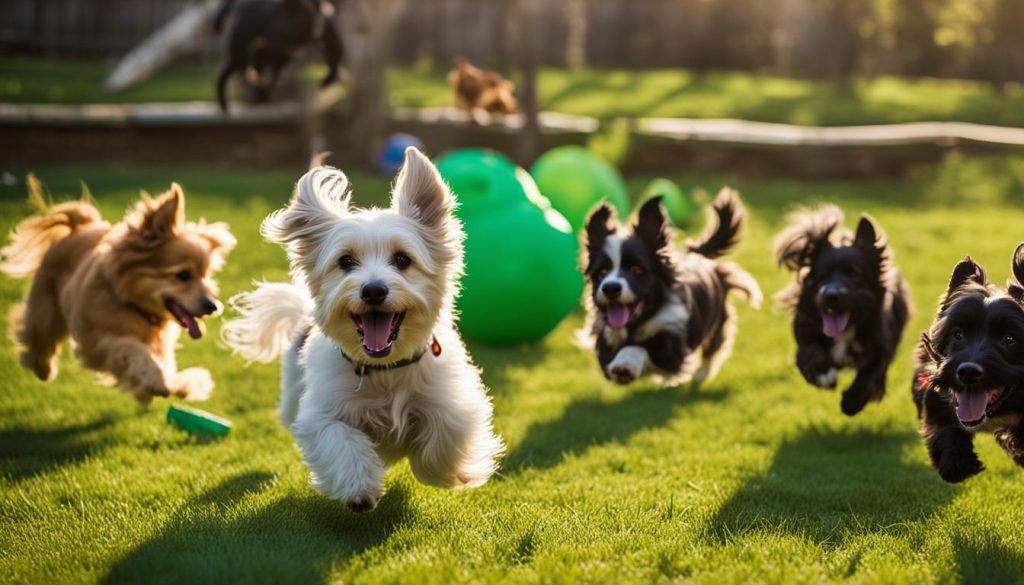When considering a family dog, it’s important to find a breed that is not only gentle and affectionate but also a good fit for your family’s lifestyle. One breed that ticks all the boxes is the Havanese. Known for their friendly and playful nature, Havaneses make excellent companions for families.
Key Takeaways:
- Havaneses are known for their affectionate and playful nature, making them great family dogs.
- Havaneses love being around people, especially children, and are generally gentle and peaceful with everyone.
- Proper socialization is important to ensure a confident and outgoing temperament in Havaneses.
- Havaneses are intelligent and trainable, making them a great choice for families looking for a dog that can participate in obedience and agility training.
- However, Havaneses can be prone to separation anxiety and may require extra attention and companionship to prevent behavioral issues.
The Temperament of Havaneses as Family Dogs

When it comes to choosing a family pet, the temperament of the dog is a crucial factor to consider. Havaneses are known for their friendly and people-oriented nature, making them excellent companions for households with children. They have a gentle and peaceful disposition and are generally well-behaved around other pets.
However, Havaneses can be cautious around strangers. Proper socialization from an early age is key to building their confidence and ensuring they feel comfortable in different situations.
Havaneses have an independent streak, but they are not dominant. They are highly trainable and respond well to positive reinforcement methods, especially when food rewards are involved. This intelligence and trainability make them a great choice for families looking for a dog that can participate in obedience and agility training.
Key Characteristics of Havaneses as Family Dogs:
- Affectionate and people-oriented
- Gentle and peaceful disposition
- Good with children and other pets
- Cautious around strangers, requires socialization
- Trainable and intelligent
Overall, Havaneses make wonderful family pets due to their loving and sociable nature. With proper training, socialization, and a loving environment, they can thrive as valued members of the family.
| Havaneses | |
|---|---|
| Affectionate | Yes |
| Gentle with children | Yes |
| Good with other pets | Yes |
| Cautious with strangers | Yes |
| Trainable | Yes |
Havaneses and Family Dynamics: Raising Havaneses in a Family Setting
Training and Behavior
Training Havaneses in a family setting is crucial for their well-being and the harmony of the household. With their intelligence and eagerness to please, Havaneses are highly trainable and excel in obedience and agility. However, they can be slow to housetrain, requiring consistency and patience. Crate training is highly recommended to aid in the process.
Another aspect to consider is their tendency to bark, especially when announcing visitors. Proper training is needed to curtail excessive barking and teach them when it is appropriate to alert their family. Havaneses respond well to positive reinforcement training methods that include food rewards, making the training process enjoyable for both the dog and the family.
Behavioral Challenges
While Havaneses are generally friendly and gentle, there are potential behavioral challenges that may arise in a family setting. Separation anxiety is a common issue among Havaneses and can lead to destructive behaviors when they are left alone for long periods of time. To prevent this, it’s important to gradually acclimate them to being alone and provide them with mental stimulation and interactive toys.
Additionally, Havaneses can be prone to shyness if not properly socialized from a young age. Exposure to different people, places, and situations is essential to ensure they develop a confident and well-adjusted temperament. Early socialization can help prevent shyness and ensure that they are comfortable in various family and social settings.
Table: Training and Behavior Considerations for Havaneses in a Family Setting
| Training and Behavior Considerations | Details |
|---|---|
| Housetraining | Consistent crate training is recommended to assist with housetraining, as Havaneses can be slow to learn. |
| Barking | Havaneses may bark excessively, especially when announcing visitors. Training methods can help curb excessive barking and teach appropriate behavior. |
| Separation Anxiety | Havaneses are prone to separation anxiety and may exhibit destructive behaviors when left alone for long periods. Gradual acclimation to alone time and mental stimulation can help alleviate this issue. |
| Shyness | Proper socialization from a young age is crucial to prevent shyness and ensure a confident temperament in various family and social settings. |
By understanding the unique training and behavioral needs of Havaneses in a family setting, pet parents can create a positive and harmonious environment for their beloved furry companions. Through consistent training, socialization, and providing mental stimulation, Havaneses can thrive as well-behaved and balanced members of the family.
Grooming and Maintenance Needs of Havaneses in a Family Setting

Havaneses have a beautiful, long, and silky coat that requires regular grooming and maintenance to keep it healthy and tangle-free. As a family pet, it is important to understand the grooming needs of Havaneses to ensure their well-being and overall appearance. Regular brushing and combing sessions are necessary to prevent matting and to keep their coat in top condition.
It is recommended to brush and comb your Havaneses at least once a week. Use a slicker brush and a wide-toothed comb to gently remove any tangles or knots. Pay special attention to the areas behind the ears, armpits, and rear end, as these are common areas for matting to occur. Regular grooming not only keeps their coat looking beautiful, but it also helps to distribute their natural oils and promote a healthy skin and coat.
Some pet parents choose to have their Havaneses’ coat trimmed for easier maintenance. Clipping their coat short can make brushing and bathing more manageable, especially if you have a busy family schedule. However, if you decide to keep their coat long, make sure to invest in quality grooming tools and set aside regular grooming time to keep their coat looking its best.
In addition to coat care, it is important to address other maintenance needs of Havaneses. Regular dental care, including brushing their teeth and providing dental chews, is essential to prevent dental disease. Their ears should also be checked and cleaned regularly to prevent infections. Lastly, remember to trim their nails regularly to prevent overgrowth and discomfort.
Overall, grooming and maintenance play a crucial role in keeping Havaneses healthy and happy in a family setting. By establishing a regular grooming routine and addressing their specific needs, you can ensure that your Havaneses looks and feels their best.
Havaneses as Watchdogs in a Family Setting

Havaneses may not be known for their aggressive nature, but they possess qualities that make them good watchdogs in a family setting. Their alertness and tendency to bark when they sense something new or unusual make them excellent at alerting their family to potential dangers or strangers approaching the home. While their small size may not make them physically intimidating, their vocal nature and protective instincts make them a valuable asset when it comes to home security.
However, it is important to establish boundaries and train Havaneses to recognize when their barking is appropriate and when it is not. Excessive barking can become a nuisance, and consistent training is necessary to ensure they are responsive to commands and can differentiate between genuine threats and everyday occurrences. With proper training, Havaneses can strike a balance between being watchful and being well-behaved members of the family.
| Characteristics of Havaneses as Watchdogs | Benefits |
|---|---|
| Alertness | Havaneses are quick to detect and react to unfamiliar or suspicious activities, making them highly alert watchdogs. |
| Protective Nature | Despite their small size, Havaneses possess a protective instinct towards their family members, and they will not hesitate to vocalize their concerns when they sense a potential threat. |
| Fearlessness | Although Havaneses are generally gentle and peaceful, they are not easily intimidated by strangers or unfamiliar situations, which adds to their effectiveness as watchdogs. |
| Vocalization | Havaneses have a tendency to bark, and this vocal nature can deter potential intruders and alert the family to any potential dangers. |
While Havaneses make good watchdogs, it is important to remember that their primary role is still that of a companion and family pet. They thrive on human companionship and should not be left alone for extended periods of time. Proper socialization, training, and attention to their overall well-being are essential to ensure they are happy, well-adjusted members of the family.
Potential Challenges When Raising Havaneses in a Family Setting

While Havaneses make wonderful family dogs, there are some potential challenges that owners should be aware of. Understanding and preparing for these challenges can help ensure a successful and harmonious relationship with your Havanese.
Grooming and Maintenance
Havaneses have a beautiful, long, and silky coat that requires regular grooming and maintenance. This includes brushing and combing at least once a week to prevent matting and keep their coat healthy. Some owners choose to clip their coat short for easier maintenance. Additionally, Havaneses require regular dental care to prevent dental disease, and their ears should be cleaned and checked regularly to prevent infections.
Separation Anxiety
Havaneses are known for their strong attachment to their human family members and can be prone to separation anxiety. They may become anxious and exhibit destructive behaviors if left alone for long periods of time. It is important to gradually acclimate them to being alone and provide them with mental stimulation and interactive toys to keep them occupied when you are not around.
Shyness and Socialization
Some Havaneses may have a tendency towards shyness, especially if they have not been properly socialized as puppies. It is crucial to expose them to different people, animals, and environments from a young age, using positive reinforcement techniques to build confidence and ensure a well-adjusted adult dog. Proper socialization can help prevent shyness and fear-based behaviors in Havaneses.
Housebreaking Difficulties
Havaneses can sometimes be slow to housetrain and may require consistent crate training and a regular schedule to establish good bathroom habits. Positive reinforcement techniques, such as rewarding them with treats and praise when they eliminate in the appropriate area, can be effective in housebreaking Havaneses.
Barking
Like many small breeds, Havaneses have a tendency to bark. While their alertness and tendency to bark can make them good watchdogs, excessive barking can be a challenge in a family setting. Training and positive reinforcement techniques can help teach them when barking is appropriate and when it is not, ensuring a peaceful environment for everyone in the household.
Tips for Choosing the Right Havaneses for Your Family

When it comes to choosing the right Havaneses for your family, there are a few important factors to consider. Whether you are considering adopting an adult dog or getting a puppy from a reputable breeder, the following tips can help guide you in making the best decision for your family:
- Research reputable breeders: If you decide to get a puppy, it is crucial to choose a reputable breeder who focuses on breeding healthy and well-tempered Havaneses. Look for breeders who conduct health screenings and provide proper care for their puppies.
- Consider adoption: Adopting an adult Havaneses from an animal shelter or rescue group can be a rewarding experience. With an adult dog, you can observe their temperament and behavior before making a decision. Plus, you’ll be giving a loving home to a dog in need.
- Evaluate temperament: Each Havaneses has a unique personality, so it’s important to find a dog whose temperament aligns with your family’s lifestyle. Some Havaneses may be more outgoing and energetic, while others may be more laid-back and calm. Consider your family’s activity level and preferences when evaluating a dog’s temperament.
- Meet the parents: If possible, try to meet the parents of the puppy you are considering. This can give you an idea of how the puppy may turn out in terms of temperament and physical characteristics. If the parents have a good temperament and are healthy, there’s a higher chance that the puppy will be too.
Choosing the right Havaneses for your family is a big decision, but with careful consideration and research, you can find the perfect match. Remember to prioritize health, temperament, and compatibility with your family’s lifestyle. By taking the time to choose the right Havaneses, you can ensure a happy and harmonious relationship with your new furry friend.
Table: Comparison of Havaneses Breeders
| Breeder | Health Screenings | Temperament Testing | Parental Health |
|---|---|---|---|
| Breeder A | ✓ | ✓ | ✓ |
| Breeder B | ✓ | ✓ | ✓ |
| Breeder C | ✓ | ✓ | X |
| Breeder D | X | ✓ | ✓ |
“Choosing the right Havaneses for your family is not a decision to be taken lightly. It’s important to consider the breeder’s reputation, the dog’s temperament, and how well they will fit into your family’s lifestyle. Taking the time to research and meet potential Havaneses can ensure a happy and fulfilling relationship for years to come.” – Experienced Havaneses Owner
By following these tips and thoroughly researching your options, you can find a Havaneses that will be a wonderful addition to your family. Whether you choose to adopt or purchase a puppy, prioritize health, temperament, and compatibility to ensure a happy and harmonious relationship. With their affectionate and playful nature, Havaneses can bring joy and companionship to your family for many years to come.
The Health and Lifespan of Havaneses as Family Dogs

Havaneses are generally a healthy breed with a lifespan of 14 to 16 years. However, they can be prone to certain health issues that owners need to be aware of and manage effectively. Regular veterinary care, including vaccinations and preventive measures, is crucial to maintain the health and well-being of Havaneses.
Some of the common health conditions that Havaneses may be susceptible to include:
- Progressive retinal atrophy: This is a genetic condition that affects the eyes and can lead to vision loss or blindness. Regular eye examinations by a veterinarian can help identify any potential issues early on.
- Legg-Calvé-Perthes disease: This is a condition that affects the hip joint and can cause pain and lameness. Surgical treatment may be necessary in severe cases.
- Patellar luxation: This refers to the dislocation of the kneecap, which can cause varying degrees of lameness and discomfort. In some cases, surgery may be required to correct the issue.
- Dental disease: Havaneses are prone to dental issues such as gum disease and tooth decay. Regular dental care, including brushing their teeth and annual dental cleanings by a veterinarian, is essential to prevent dental disease.
To minimize the risk of these health conditions, it is important to work with a reputable breeder who conducts health screenings on their breeding dogs. This can help ensure that puppies are less likely to develop genetic health problems. Additionally, maintaining a healthy diet, providing regular exercise, and keeping up with vaccinations and preventive care are all important aspects of keeping Havaneses healthy and happy.
It is crucial for Havaneses owners to be proactive in monitoring their dog’s health and seeking veterinary care when needed. Early detection and treatment of any potential health issues can help ensure a longer and higher quality of life for these beloved family dogs.
Considerations for Owning a Havaneses in a Family Setting

Owning a Havaneses in a family setting requires careful consideration and understanding of their specific needs. These adorable dogs make great companions, but they thrive on human interaction and can become anxious or exhibit unwanted behaviors if left alone for extended periods of time. Here are some important considerations to keep in mind when bringing a Havaneses into your family:
Socialization and Training
Havaneses are sociable by nature and love being around people. However, they may be cautious with strangers if not properly socialized. It’s crucial to expose them to various people, situations, and experiences from a young age to build their confidence and ensure they feel comfortable in different environments. Additionally, Havaneses are intelligent and trainable, which makes them highly responsive to obedience training. Consistent and positive reinforcement methods work well with this breed, helping them become well-behaved members of the family.
Regular Grooming and Maintenance
Havaneses have a beautiful, long, and silky coat that requires regular grooming to keep it healthy and free from matting. Weekly brushing and combing are necessary to prevent tangles and maintain their signature fluffy appearance. Some owners choose to keep their Havaneses in a shorter clip for easier maintenance. Additionally, regular dental care and ear cleaning are important to prevent dental disease and ear infections. These grooming needs should be considered before bringing a Havaneses into your family.
Exercise and Mental Stimulation
Despite their small size, Havaneses are energetic dogs that require regular exercise and mental stimulation. Daily walks, playtime, and interactive toys can help keep them physically and mentally engaged. They enjoy participating in activities such as obedience training, agility courses, and puzzle toys that challenge their intelligence. Ensuring they have enough physical and mental stimulation is important to prevent boredom and destructive behaviors.
Family Commitment
Owning a Havaneses is a long-term commitment. They thrive in a family environment where they can receive love, attention, and companionship. Havaneses are not suitable for families where everyone is away for extended periods of time or where they will be left alone frequently. They are happiest when they are included in family activities and have someone around most of the time. If you are considering a Havaneses as a family pet, be prepared to provide the time, attention, and care they need to thrive.
Wrapping Up
To summarize, Havaneses are excellent family dogs due to their friendly and people-oriented nature. They thrive on human companionship and are especially fond of children. With proper socialization, they can get along well with other pets in the household.
However, it is important to be aware of the potential challenges that come with owning a Havaneses. They can be prone to separation anxiety and may exhibit destructive behaviors or excessive barking if left alone for long periods of time. Consistent training, mental stimulation, and companionship are key to preventing these behavioral issues.
Regular grooming and veterinary care are essential for maintaining the health and well-being of Havaneses. Their long, silky coat requires regular maintenance, and dental care is important to prevent dental disease. Additionally, they need regular exercise, mental stimulation, and training to keep them happy and well-adjusted in a family setting.
In summary, Havaneses make wonderful family dogs for those who are willing to provide them with the love, attention, and care they require. With their affectionate nature, intelligence, and trainability, they can bring joy and companionship to any family.
FAQ
Are Havaneses good family dogs?
Yes, Havaneses are known for being good family dogs due to their affectionate and playful nature.
What is the temperament of Havaneses as family dogs?
Havaneses are friendly and people-oriented, making them great companions for families. They are generally gentle and peaceful with everyone, including children and other pets.
How trainable are Havaneses in a family setting?
Havaneses are intelligent and respond well to training. They are known for their trainability, making them a great choice for families looking for a dog that can participate in obedience and agility training.
What are the grooming needs of Havaneses in a family setting?
Havaneses have a long, silky coat that requires regular maintenance. They need to be brushed and combed at least once a week to prevent matting and keep their coat healthy. Some pet parents choose to clip their coat short for easier maintenance.
Can Havaneses be good watchdogs in a family setting?
Yes, Havaneses can make good watchdogs due to their alertness and tendency to bark when they sense something new or unusual. They are quick to alert their family to potential dangers or strangers approaching the home.
What are the potential challenges when raising Havaneses in a family setting?
Potential challenges when raising Havaneses in a family setting include separation anxiety, shyness, housebreaking difficulties, barking, and frequent grooming needs.
What tips should I consider when choosing a Havaneses for my family?
When choosing a Havaneses for your family, consider adopting an adult dog to see their temperament beforehand. If you prefer a puppy, choose a reputable breeder and select a puppy with the right temperament for your family.
What health considerations should I be aware of when owning a Havaneses in a family setting?
While Havaneses are generally a healthy breed, they can be prone to certain health issues, including progressive retinal atrophy, Legg-Calvé-Perthes disease, patellar luxation, and dental disease. Regular veterinary care is crucial to maintain their health and well-being.
What should I consider before owning a Havaneses in a family setting?
Owning a Havaneses requires commitment and dedication. They thrive on human companionship and do not like being left alone for long periods of time. Regular grooming, proper training, exercise, and mental stimulation are necessary for their well-being.
Can you provide a summary of Havaneses as family dogs?
Havaneses are friendly, affectionate, and playful dogs that make great family pets. They are good with children and other pets when properly socialized. However, they require consistent training, grooming, and companionship to thrive in a family setting.






